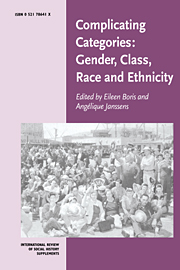Book contents
- Frontmatter
- Contents
- Notes on Contributors
- Complicating Categories: An Introduction
- Family Concerns: Gender and Ethnicity in Pre-Colonial West Africa
- Narratives Serially Constructed and Lived: Ethnicity in Cross-Gender Strikes 1887–1903
- Competing Inequalities: The Struggle Over Reserved Legislative Seats for Women in India
- “The Black Man's Burden”: African Americans, Imperialism, and Notions of Racial Manhood 1890–1910
- Sex Workers or Citizens? Prostitution and the Shaping of “Settler” Society in Australia
- From Muscles to Nerves: Gender, “Race” and the Body at Work in France 1919–1939
- “Blood Is a Very Special Juice”: Racialized Bodies and Citizenship in Twentieth-Century Germany
From Muscles to Nerves: Gender, “Race” and the Body at Work in France 1919–1939
Published online by Cambridge University Press: 14 January 2010
- Frontmatter
- Contents
- Notes on Contributors
- Complicating Categories: An Introduction
- Family Concerns: Gender and Ethnicity in Pre-Colonial West Africa
- Narratives Serially Constructed and Lived: Ethnicity in Cross-Gender Strikes 1887–1903
- Competing Inequalities: The Struggle Over Reserved Legislative Seats for Women in India
- “The Black Man's Burden”: African Americans, Imperialism, and Notions of Racial Manhood 1890–1910
- Sex Workers or Citizens? Prostitution and the Shaping of “Settler” Society in Australia
- From Muscles to Nerves: Gender, “Race” and the Body at Work in France 1919–1939
- “Blood Is a Very Special Juice”: Racialized Bodies and Citizenship in Twentieth-Century Germany
Summary
In the years before and immediately after World War I, gendered and racialized bodies at work became the focus of debate and discussion in France amongst an informal alliance of engineers, doctors, scientists, employers, workers, and the state. Seduced by the promise of “modernity”, and the seemingly endless possibilities of science and mechanization, the state attempted to modernize public services and employers sought new ways to discipline labor for greater productivity. Both mobilized rationalization – Taylorism and work science – in the service of greater efficiency and in an effort to identify the allegedly “natural” qualities that made gendered and racialized workers suitable for certain kinds of jobs and would exclude them from others. A not insignificant dimension of this project lay in how French work scientists began to envision the potential uses of gendered French and colonial labor. The development of the French North-African and Indochinese colonial empires around the turn of the century heightened attention to racialized difference. World War I had opened the opportunity to use racialized colonial bodies, both on the military front and in the factory. Thinking about race and gender characteristics continued to influence work science and its applications in the 1920s and 1930s. Work scientists' experiments to ascertain the physical endurance of colonial male workers and white workers underscored the durability of gender meanings in dealing with white French workers and the instability of those meanings in assessing the abilities of workers of color.
- Type
- Chapter
- Information
- Complicating Categories: Gender, Class, Race and Ethnicity , pp. 123 - 148Publisher: Cambridge University PressPrint publication year: 2000

